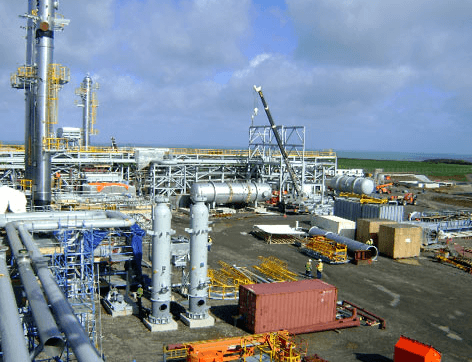GE says to build waste gas to power plant in Ghana
 GE says it will build a power plant to augment the electricity needs of Ghanaians by proposing to construct the first-ever 25MW Waste Gas to Power Plant.
GE says it will build a power plant to augment the electricity needs of Ghanaians by proposing to construct the first-ever 25MW Waste Gas to Power Plant.
According to a statement issued by the sub-Sahara Africa office of GE and copied to ghanabusinessnews.com the new plant will add equivalent power needed to supply more than 100,000 Ghanaian homes and will use Isopentane gas which would otherwise have been flared at Atuabo as the main fuel source for the plant.
The successful completion of the plant will start a pilot project to capture Isopentane gas and use it as a fuel source for generating electricity as many developing countries continue to embrace innovations that will guarantee faster solutions to energy challenges
The Atuabo Waste to Power Independent Power Project (“Atuabo”) will be the first TM2500 power plant in sub-Saharan Africa to use Isopentane gas as a fuel source and will run on GE’s latest TM2500 gas turbines.
“Not only is the Atuabo waste to power plant enabling our company to lead in innovative energy solutions in Ghana, but by using a fuel source which would otherwise have been flared as waste, we are further reducing emissions and costs,” said Mr. Fred Asamany, Strategic Advisor of Marinus Energy.
He said the innovation is good for business, the climate and eliminates the potential environmental hazards facing local communities.
“GE is offering an innovative solution which gives us the confidence to move from pilot to commercial operations” he added.
In the first phase of the pilot, Atuabo will convert the Isopentane fuel into up to 25 megawatts (MW) of power, generating enough electricity to supply power for more than 100,000 Ghanaian households. As additional gas is brought onshore, the plant is expected to add on additional gas generating units up to a capacity of 100 MW. Additional Isopentane fuel will eventually be stripped off an offshore gas supply and processed at Atuabo by the Ghana National Gas Company. The gas turbine will then start on lean gas and transfer to the Isopentane mix over time, and the power plant is intended to operate at base load throughout its life.
CEO of GE’s Gas Power Systems in Sub-Saharan Africa, Leslie Nelson is quoted as saying that “The TM2500 unit will provide unrivalled speed to deployment and flexibility to support the immediate needs of our customer – Marinus Energy, and then seamlessly transition to deliver capacity over the long term as they expand their operations”.
The Atuabo project is expected to add yet another TM2500 gas turbine to the existing fleet of ten units in the country earlier deployed in 2016.
With more than 200 units deployed and over 5 million operating hours of experience, GE’s TM2500 has proven flexibility can help bridge the power gap for short- and long-term energy planning, stabilize the grid, or reach and power remote locations.
The TM2500 mobile power plant – a trailer-mounted gas turbine generator and containerized balance of plant – can be relocated to other power plants during operation, and maintenance outages, or to remote areas. The TM2500 can also achieve full power approximately within 10 minutes making it ideal for providing a base-load bridge to permanent power installations or generating backup power for factories and industries.
In 2017, GE released several announcements reinforcing its commitments to strengthening the power sector in Ghana. The 400MW Bridge power project (https://goo.gl/1hu7LJ) will be the first LPG fired power plant in Africa and the largest LPG fired power plant in the world, while the 200MW Amandi power plant will be one of the most efficient power plants in the country and will generate the equivalent power needed to supply more than one million Ghanaian homes. In addition, GE will set up an M&D (Monitoring and Diagnostics) center in Ivory Coast which will provide the digital data and analytics service to improve the performance of GE equipment in the region.
GE works with the government, corporate customers and other stakeholders in Ghana to support economic growth through infrastructure development in the power, healthcare and transport sectors. In 2014, GE opened a 200-capacity permanent office in Accra, and now has over 100 employees – 95% of which are Ghanaians.
By Emmanuel J.K Arthur
